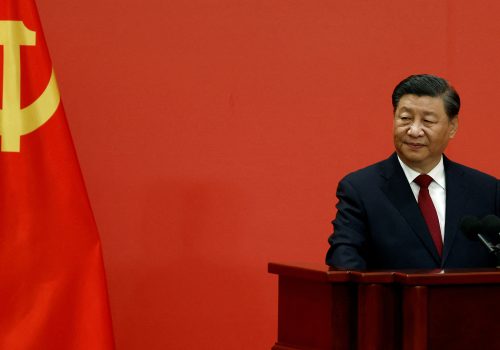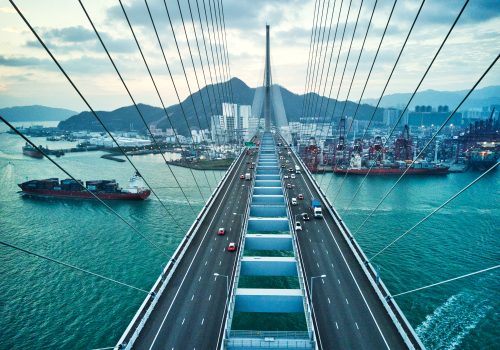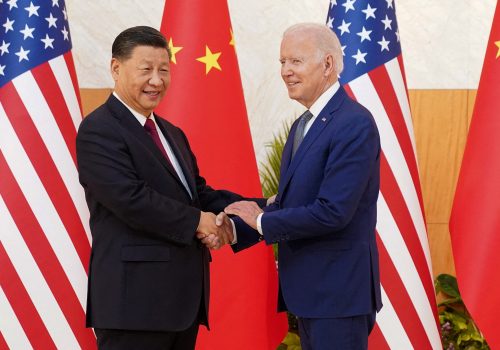US-China competition after the US midterms and the CCP 20th Congress
For the first time since becoming President, Joe Biden met face-to-face with Secretary General Xi Jinping on November 14, 2022, at the outset of the G20 Summit in Bali, Indonesia. Against the backdrop of rising tensions between the two countries, the United States hoped it would “put a floor under the relationship.” But the recent US mid-term elections and Chinese Communist Party (CCP) 20th National Congress will be more important in defining the future of US-China relations. That future will likely augur more contention, not less, with important implications for the rest of the world.
Exceeding low expectations
Despite the low expectations set by both sides—which used the occasion mainly to reiterate their red lines, the meeting produced some concrete results. Most notable is the agreement that nuclear war should never be fought and cannot be won. Though the agreement was highlighted only in the US—but not Chinese—readout of the meeting, the two leaders said they opposed the use or threat to use nuclear weapons in Ukraine.
Their public agreement cast Putin’s nuclear threats far outside the pale of international opinions, hopefully lessening the risk of nuclear escalation. In addition, the two countries agreed to resume dialogues on a range of issues, including climate change, food security, macroeconomic policy, and the debt burdens of developing countries. Secretary of State Antony Blinken is scheduled to visit Beijing early next year to follow up on these topics. However, while clearly laid-out issues are useful, the fundamental differences between the United States and China remain.
Implications of a Republican-controlled House
Under a Republican-controlled House of Representatives—albeit with a smaller majority than anticipated—the direction and tone of US-China policy will be reinforced. In the past two years, US legislators have introduced over 400 anti-China bills in Congress; more than 120 of them have secured bipartisan support and will likely move forward in the legislative process. The House will push the Biden administration—which has maintained and built on Trump’s tariffs and restrictions—to strictly implement current trade and investment controls against China and to expand control to more high-tech sectors and outbound investment flows to China.
The Taiwan Policy Act of 2022, for example, is likely to pass, and visibly raise the intensity of military and economic ties with Taiwan. It is important to monitor whether the designation of Taiwan as a major non-NATO ally of the United States would be restored by the Republican-led House in the final version of the bill. Many political analysts see such a designation as needlessly provocative towards China.
Moreover, in its 2022 report to Congress, the US-China Economic and Security Review Commission recommended that Congress ask the administration to review China’s compliance with terms of the 1999 pact whereby the United States granted China “permanent normal trade relations” status as China prepared to join the World Trade Organization in 2001. If China is found not in compliance, Congress would likely pass a law to suspend China’s normal trade relationship, as it did with Russia after the 2022 invasion of Ukraine. Judging by House Republicans’ plans for an expansive anti-China agenda, there is a good chance that Congress could consider this recommendation—if it acts accordingly, that will escalate the trade war with China.
In addition, the Republican-led House could hold a series of hearings and investigations critical of China. There may be a hearing on the role of China in supplying illicit fentanyl, which has contributed to the opioid crisis in the United States. Another tack could renew investigations into the Wuhan lab-leaked origin theory of the SARS-Cov-2 virus. There will also be investigations into Hunter Biden’s business dealings, especially with Chinese companies such as CEFC China Energy. Furthermore, high-level congressional visits to Taiwan will continue. China will be forced to respond and elevate tensions between the two countries. The fall-out will limit Biden’s room for flexibility to responsibly manage the US-China relationship.
China views US actions such as these as attacks on China’s sovereignty, national security, and development interests. China will respond robustly—specifically on Taiwan, technological and geopolitical containment.
Taiwan
China devoted considerable attention to Taiwan at the 20th CCP Congress. It will continue to dedicate resources to advance the unification campaign as part of its national rejuvenation effort. According to the white paper on Taiwan released in August 2022, China will try to achieve peaceful reunification without military means. China states it will use both carrots and sticks to encourage the Taiwanese government under the Democratic Progressive Party to, at minimum, agree to the 1992 consensus recognizing the principle of “One China.”
Failing that, and seeing the prospects of peaceful unification receding further (especially observing the opinions of younger Taiwanese) China may use military measures to achieve unification. The fact that Taiwan still refrains from formally declaring independence is no longer a key protection. The open-ended status quo for Taiwan, something Taiwan, the United States, and other Western allies want, is not acceptable to China. In this scenario, China exercises control over when and how it takes military actions against Taiwan.
Furthermore, actions by Taiwan and the United States to upgrade their economic and military relations will eventually lead China to fear a hollowing out of the US “One China” policy, to be replaced by a de facto “One China, One Taiwan” approach. This is unacceptable to China, especially since the United States clearly stated in the August 17, 1982 US-China Communique that it had no intention to pursue a policy of “Two Chinas” or “One China, One Taiwan.” Again, China will have to decide how to respond. The natural progression of events concerning Taiwan will create conflicts between the United States and China which no meetings can resolve.
Technological containment
The CCP 20th Congress emphasized the need for China to become self-reliant in science and technology. It promoted endogenous innovation as a new engine of growth to modernize the Chinese economy and military. Its effort will gain more attention and support as the United States tightens controls on the transfer of advanced technology to China. Controls are currently focused on advanced computer chips, but will likely be widened to other areas, especially those with military or dual-use applications. A Republican-led House could reinforce this trend.
The US policy of technological containment could diverge from Europe’s approach toward China. Defending his recent visit to China, German Chancellor Scholz said that Germany wants to reduce “one-sided dependence” on China in critical areas such as minerals and high-tech goods, but not to decouple from it. Typifying this approach are almost simultaneous decisions by the German government. It allowed China Overseas Shipping Holding Company (COSCO) to buy a 24.9 percent stake—just shy of a blocking minority—in the port of Hamburg, but blocked the acquisition of two German semiconductor making companies by Chinese firms.
Scholz’s trip to China with a large business delegation and his support for the port of Hamburg deal have both been criticized from within Germany and in many allied countries. But the essence of the approach he articulated will likely be adopted by many European countries relying on business with China for economic growth. Such slight differences create an opportunity for China to work around the US technological containment and render it less effective.
Geopolitical containment
In contrast to former President Trump’s unilateral approach, the Biden administration has tried hard and made some progress in building alliances to deal with China. In the Indo-Pacific region, the United States has strengthened the Quadrilateral Security Alliance (Quad) with Japan, Australia, and India; launched the AUKUS trilateral security pact with the United Kingdom and Australia; upgraded its relationship with the Association of Southeast Asian Nations to the comprehensive strategic partnership level (which China did in 2021); and rolled out its Indo-Pacific Economic Framework with fourteen countries participating in negotiations.
In response, China has intensified the implementation of its trade and investment agreements with countries in the region. It helped establish the Regional Comprehensive Economic Partnership, pushed forward in its application to join the Comprehensive and Progressive Agreement for Trans-Pacific Partnership, and resuscitated the proposed trilateral free trade agreement with Japan and South Korea. China also launched a charm offensive to consolidate relationships with countries in the region. In one case, China gave red-carpet treatment to the Vietnamese Communist Party Secretary General Nguyen Phu Trong, the first foreign leader to visit China after the CCP 20th National Congress.
The competition for influence between the United States and China can offer opportunities for countries in the region to balance off one versus the other, but it can also narrow maneuvering room for many countries not wanting to take sides in the US-China rivalry. The eventual outcome depends mainly on how nimbly each country can navigate the turbulent relationship between the two superpowers.
Policy actions stemming from the US mid-term election results and the CCP 20th National Congress will ensure that strategic competition and rivalry between the United States and China will remain intense. This has important implications for other countries—benign words at the Biden-Xi summit in Bali notwithstanding.
Hung Tran is a nonresident senior fellow at the Atlantic Council, former executive managing director at the Institute of International Finance and former deputy director at the International Monetary Fund.
Further reading

Thu, Nov 10, 2022
Will Xi take a new economic direction? China has trillions at stake.
New Atlanticist By Niels Graham
Without reform, China's economy could be five trillion dollars smaller than projected by the end of the decade—with ramifications for global growth.

Mon, Oct 24, 2022
Dual circulation in China: A progress report
EconoGraphics By Hung Tran
Faced with a challenging international environment and hostile efforts by the United States to restrict China’s access to high technology and its products, China has adopted a dual circulation strategy to make its economy more balanced and resilient. Dual circulation means reducing the role of foreign trade in driving the Chinese economy while improving the quality of trade.

Mon, Nov 14, 2022
What did Xi and Biden just accomplish?
Fast Thinking By
Our Sinologists read between the lines of the diplomat-speak following the US president and Chinese leader's meeting in Bali.